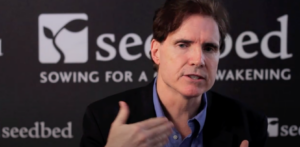Paul Piff is a psychologist who explores the affect of money on human nature. His team conducted an experiment using a rigged Monopoly game and two college students to whom Piff has given the names “T-shirt” and “Glasses.” When the game begins, T-shirt has $2000 in Monopoly money and collects $200 every time he passes “go,” while Glasses gets $1000 from the Monopoly bank and $100 for passing “go.” T-shirt can roll two dice but Glasses can only roll one. They are given fifteen minutes to play this rigged game while a team of psychologists watches on camera to analyze every facial tick and hand gesture.
T-Shirt has no choice but to win and at first, he acknowledges it. Soon, though, he is whizzing around the board, banging his Rolls Royce game piece as he counts out his turn (the game piece for Glasses is an elf). By the time the game is over, T-shirt is totally self-absorbed — counting moves, counting money, taking his opponent’s money without no sign of sympathy.
The experiment is designed to expose something about how money affects behavior. Piff discovered that “putting someone in a role where they’re more privileged and have more power in a game makes them behave like people who actually do have more power, more money, and more status.”
Money can create the sense of superiority. It has the power to make us influential and also selfish, courageous and also defensive. It has the potential for both blessing and curse, whether you have too much of it or too little.
Jesus tells a story very similar to Piff’s experiment. In his story, a wealthy man gives the equivalent of a hundred years’ wages to one man, forty years’ wages to another, and twenty years’ wages to a third. By any standard, any of those three men are holding great wealth but the comparison causes the third guy to shut down. While the first two invest their funds and produce a 100% return, the third guy buries his investment and has nothing to show for it.
Their story inspires me to think about the psychology, challenges and opportunities surrounding the “haves” and “have-nots.”
Five-talent People: Rejecting self-absorbed power
“I used to spend a lot of time thinking about my money,” a wealthy friend once told me. “I thought about it when I had none of it. I worried about it inordinately then. And when we finally made some money, I worried about losing it.”
For five-talent people, this is an interesting psychological shift. The danger is idolatry in one of two directions: 1) thinking “somehow I did this myself,” my friend says; or 2) thinking “money is what I can lean on and believe in, because money is easier to understand.”
So how do we reject self-absorbed power? The real trick is learning to hold money with an open hand. The answer seems to simplistic: Learn to give. Those who do discover there is a freedom and joy in the stewardship of money that we simply can’t find in the “ownership” of it.
Two-talent People: Embracing creativity
Kevin Myers talks about the difference between the five-talent servant and the two-talent servant. He says five-talent leaders seem to live above the law of gravity. Things seem to come to them effortlessly. Most of us live under the law of gravity. In other words, Myers says, some people lead in leaps, but most people lead in layers.
Living in layers requires a kind of patience that breeds frustration. The day-in, day-out of making a living can sap the creativity out of life. The challenge for two-talent people is to embrace creative opportunities when they come our way. Maybe we don’t have a ton of resources, but what we thought was impossible might just be possible. This may mean letting go of things we can afford, like impulsive on-line buying and eating out and Starbucks, all of which may actually stifle the bigger dreams God has for us. It also means being more intentional about looking for creative opportunities to serve and give, to make the most of our investments.
One-talent People: Rejecting a spirit of poverty
The challenge of the one-talent person is to reject the spirit of poverty and fear-based habits. Living at the level of survival can keep us from trusting God to provide.
A friend says this: “The clenched fist around that $20 also prevents additional blessings from coming to you. There is a faithfulness that is scary, giving money especially when you don’t have it. Maybe it even brings bigger blessings. Like so much of the gospel that is a paradox, it is when it is hardest to step out that we exercise our faith most …”
The times in my life when I’ve clamped down on everything,” my friend continues, “I’ve suffered for it. When I think, maybe this isn’t a good time, maybe I shouldn’t now … that is exactly the time when I know I need to lean in. I don’t want to say there is such a thing as a prosperity gospel, but I can say that when I give, I am the one who benefits.”
Interesting isn’t it? — that the amount of money doesn’t really change the solution to our management of it. Whatever the level, giving is how we keep a healthy perspective. Giving is how we remember whose money it is and how we keep our imaginations nimble.
The point of giving isn’t that God wants you to send him a check so he can get things done. The point is that the Creator of your life knows how you’re wired and what it will take for you to make the most of this existence.
In a word: give. As with most things of the Kingdom, it isn’t logical but it is true: giving is how we get rich.
* Find Paul Piff’s TED talk here: https://www.ted.com/talks/paul_piff_does_money_make_you_mean?language=en








